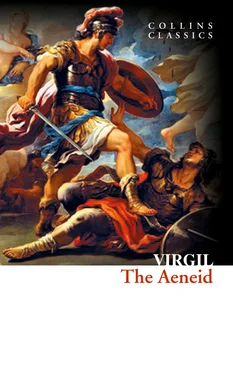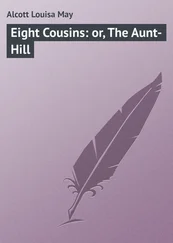But we, more num’rous, intercept his flight.
As when some peasant, in a bushy brake,
Has with unwary footing press’d a snake;
He starts aside, astonish’d, when he spies
His rising crest, blue neck, and rolling eyes;
So from our arms surpris’d Androgeos flies.
In vain; for him and his we compass’d round,
Possess’d with fear, unknowing of the ground,
And of their lives an easy conquest found.
Thus Fortune on our first endeavor smil’d.
Coroebus then, with youthful hopes beguil’d,
Swoln with success, and a daring mind,
This new invention fatally design’d.
‘My friends,’ said he, ‘since Fortune shows the way,
’Tis fit we should th’ auspicious guide obey.
For what has she these Grecian arms bestow’d,
But their destruction, and the Trojans’ good?
Then change we shields, and their devices bear:
Let fraud supply the want of force in war.
They find us arms.’ This said, himself he dress’d
In dead Androgeos’ spoils, his upper vest,
His painted buckler, and his plumy crest.
Thus Ripheus, Dymas, all the Trojan train,
Lay down their own attire, and strip the slain.
Mix’d with the Greeks, we go with ill presage,
Flatter’d with hopes to glut our greedy rage;
Unknown, assaulting whom we blindly meet,
And strew with Grecian carcasses the street.
Thus while their straggling parties we defeat,
Some to the shore and safer ships retreat;
And some, oppress’d with more ignoble fear,
Remount the hollow horse, and pant in secret there.
“But, ah! what use of valor can be made,
When heav’n’s propitious pow’rs refuse their aid!
Behold the royal prophetess, the fair
Cassandra, dragg’d by her dishevel’d hair,
Whom not Minerva’s shrine, nor sacred bands,
In safety could protect from sacrilegious hands:
On heav’n she cast her eyes, she sigh’d, she cried—
’Twas all she could—her tender arms were tied.
So sad a sight Coroebus could not bear;
But, fir’d with rage, distracted with despair,
Amid the barb’rous ravishers he flew:
Our leader’s rash example we pursue.
But storms of stones, from the proud temple’s height,
Pour down, and on our batter’d helms alight:
We from our friends receiv’d this fatal blow,
Who thought us Grecians, as we seem’d in show.
They aim at the mistaken crests, from high;
And ours beneath the pond’rous ruin lie.
Then, mov’d with anger and disdain, to see
Their troops dispers’d, the royal virgin free,
The Grecians rally, and their pow’rs unite,
With fury charge us, and renew the fight.
The brother kings with Ajax join their force,
And the whole squadron of Thessalian horse.
“Thus, when the rival winds their quarrel try,
Contending for the kingdom of the sky,
South, east, and west, on airy coursers borne;
The whirlwind gathers, and the woods are torn:
Then Nereus strikes the deep; the billows rise,
And, mix’d with ooze and sand, pollute the skies.
The troops we squander’d first again appear
From several quarters, and enclose the rear.
They first observe, and to the rest betray,
Our diff’rent speech; our borrow’d arms survey.
Oppress’d with odds, we fall; Coroebus first,
At Pallas’ altar, by Peneleus pierc’d.
Then Ripheus follow’d, in th’ unequal fight;
Just of his word, observant of the right:
Heav’n thought not so. Dymas their fate attends,
With Hypanis, mistaken by their friends.
Nor, Pantheus, thee, thy miter, nor the bands
Of awful Phoebus, sav’d from impious hands.
Ye Trojan flames, your testimony bear,
What I perform’d, and what I suffer’d there;
No sword avoiding in the fatal strife,
Expos’d to death, and prodigal of life;
Witness, ye heavens! I live not by my fault:
I strove to have deserv’d the death I sought.
But, when I could not fight, and would have died,
Borne off to distance by the growing tide,
Old Iphitus and I were hurried thence,
With Pelias wounded, and without defense.
New clamors from th’ invested palace ring:
We run to die, or disengage the king.
So hot th’ assault, so high the tumult rose,
While ours defend, and while the Greeks oppose
As all the Dardan and Argolic race
Had been contracted in that narrow space;
Or as all Ilium else were void of fear,
And tumult, war, and slaughter, only there.
Their targets in a tortoise cast, the foes,
Secure advancing, to the turrets rose:
Some mount the scaling ladders; some, more bold,
Swerve upwards, and by posts and pillars hold;
Their left hand gripes their bucklers in th’ ascent,
While with their right they seize the battlement.
From their demolish’d tow’rs the Trojans throw
Huge heaps of stones, that, falling, crush the foe;
And heavy beams and rafters from the sides
(Such arms their last necessity provides)
And gilded roofs, come tumbling from on high,
The marks of state and ancient royalty.
The guards below, fix’d in the pass, attend
The charge undaunted, and the gate defend.
Renew’d in courage with recover’d breath,
A second time we ran to tempt our death,
To clear the palace from the foe, succeed
The weary living, and revenge the dead.
“A postern door, yet unobserv’d and free,
Join’d by the length of a blind gallery,
To the king’s closet led: a way well known
To Hector’s wife, while Priam held the throne,
Thro’ which she brought Astyanax, unseen,
To cheer his grandsire and his grandsire’s queen.
Thro’ this we pass, and mount the tow’r, from whence
With unavailing arms the Trojans make defense.
From this the trembling king had oft descried
The Grecian camp, and saw their navy ride.
Beams from its lofty height with swords we hew,
Then, wrenching with our hands, th’ assault renew;
And, where the rafters on the columns meet,
We push them headlong with our arms and feet.
The lightning flies not swifter than the fall,
Nor thunder louder than the ruin’d wall:
Down goes the top at once; the Greeks beneath
Are piecemeal torn, or pounded into death.
Yet more succeed, and more to death are sent;
We cease not from above, nor they below relent.
Before the gate stood Pyrrhus, threat’ning loud,
With glitt’ring arms conspicuous in the crowd.
So shines, renew’d in youth, the crested snake,
Who slept the winter in a thorny brake,
And, casting off his slough when spring returns,
Now looks aloft, and with new glory burns;
Restor’d with poisonous herbs, his ardent sides
Reflect the sun; and rais’d on spires he rides;
High o’er the grass, hissing he rolls along,
And brandishes by fits his forky tongue.
Proud Periphas, and fierce Automedon,
His father’s charioteer, together run
To force the gate; the Scyrian infantry
Rush on in crowds, and the barr’d passage free.
Ent’ring the court, with shouts the skies they rend;
And flaming firebrands to the roofs ascend.
Himself, among the foremost, deals his blows,
And with his ax repeated strokes bestows
On the strong doors; then all their shoulders ply,
Till from the posts the brazen hinges fly.
He hews apace; the double bars at length
Yield to his ax and unresisted strength.
A mighty breach is made: the rooms conceal’d
Appear, and all the palace is reveal’d;
The halls of audience, and of public state,
Читать дальше












